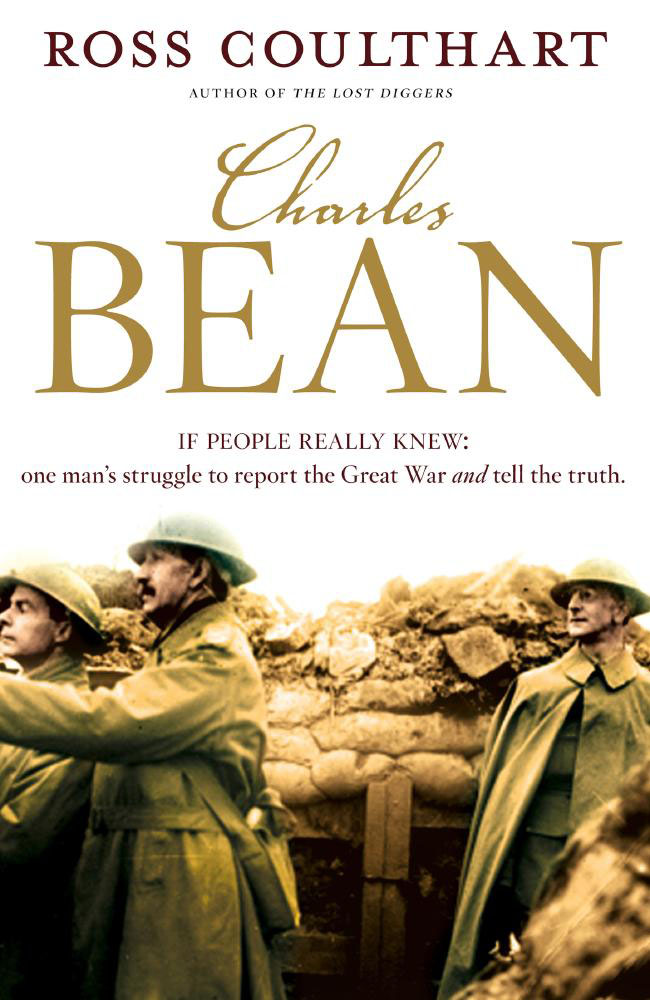This book is an exploration of the nature of journalism, politics and history that utilises Charles Bean’s life as the vehicle. Such an exploration would have great appeal to Ross Coulthart as an award winning investigative journalist who has reported on contemporary military operations; history buff; and author of several books, including The Lost Diggers. But this approach detracts from Charles Bean being an informed, objective and balanced biography. The sub-title of the book, “If people really knew: one man’s struggle to report the Great War and tell the truth”, belies his perspective as an investigative journalist rather than an historian.
As Australia’s “official war correspondent”, a role that is barely imaginable today, Bean was caught between his responsibilities as a journalist to report accurately on the carnage and his duty as a patriot — and army captain — to do everything he could to support the Australian war effort. The two aims ultimately may have been incompatible. Coulthart opens his account with a quote from British Prime Minister David Lloyd George in 1917: “If people really knew, the war would be stopped tomorrow. But of course they don’t – and can’t know.”
By exploring the many tensions between journalism, jingoism or nationalism, and recording history, Coulthart concludes that Bean was a better historian than he was a journalist. Coulthart, perhaps unsurprisingly, identifies that many of Bean’s dispatches from the front, which were subject to strict military censorship, were at odds with what he had actually witnessed and recorded in his diaries. “There is a lot of evidence in Bean’s favour to show that he did as good a job as he was allowed to do … To his great credit Bean never fell into the trap of embellishing his copy simply in search of a by-line or a happy editor … Bean did not want to be a ‘star’ news reporter if that meant compromising the truth”, Coulthart writes.
The key issue faced by World War I correspondents was accuracy. Many stayed back at headquarters and took as gospel the often false and nationalistic nonsense fed to them by the high command. Very few followed Bean’s lead and ventured onto the battlefield to gather eye witness accounts of the fighting. He also did the job with great courage. He was exposed to enemy fire on numerous occasions as he observed the war and at times risked his life to rescue wounded diggers.
Only later in the Official History volumes was Bean able to lay the facts out more honestly, although with the passage of time Coulthart accuses Bean of pulling his punches on Australian commanders in his coverage of military disasters such as Gallipoli, Bullecourt and Fromelles.
Other critics have identified that Charles Bean contains several errors of fact. Coulthart, also, is sometimes prone to bias through the selective exclusion of information. In several instances he does not adequately take into account the broader context of a particular event or action and is keen to play to the “lions led by donkeys” trope, one increasingly discredited by more than 30 years of scholarship, with his unqualified quotation at the heading of chapter 16 (p. 291) from Bean that the British Army consisted of “generals without brains and an army without physique”. I found that Coulthart’s occasional use of modern and popular language detracted from the historical narrative.
Coulthart’s claim that he possesses “a unique insight” into his subject because, like Bean, he studied law, worked at some point for The Sydney Morning Herald, and was an embedded journalist with the Australian forces for short durations in recent conflicts, is a bit of a stretch. The connection between historical events and contemporary military operations is good for marketing purposes, but does not really add value to the historical account or the analysis.
Coulthart also takes to task the people of past for the crime of being born before us and living within the cultural norms of their time. Bean was a product of his times and, during the war years at least, snidely anti-Semitic, and his prejudices clouded his judgment of John Monash, and were a factor in his campaign to have the great general replaced by a lesser man. Bean carried the moral norms of his class, who believed they were born to rule the empire, and could not conceive of the son of a German-born Jewish store-holder succeeding in a military career through aptitude alone. “We do not want Australia represented by men mainly because of their ability, natural and in-born among Jews, to push themselves”, wrote Bean. The gentry felt ambition to be vulgar, because they had no use for it themselves.
Coulthart draws heavily from Bean’s diaries and so the compare-and-contrast approach with his articles and the official history is something new. Charles Bean has a large number of photographs, a bibliography, end notes, and an index; but no maps.
Charles Bean was awarded as joint winner for Australian History in the 2015 Prime Minister’s Literary Awards and has been described as “pacey”, “perceptive” and “readable”. A general reader, perhaps open to a slightly jingoistic account, might enjoy Coulthart’s approach and style, but on balance, my assessment is that Coulthart is a better journalist or storyteller than historian and seasoned military history readers may not find Charles Bean sufficiently objective and balanced

Contact Marcus Fielding about this article.






